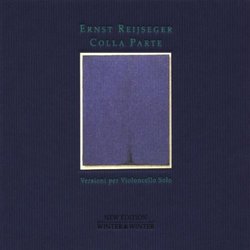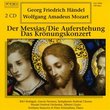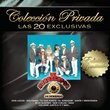| All Artists: Ernst Reijseger, Dollar / Ibrahim, Abdullah Brand, Amsterdam String Trio, Arcado String Trio, Guus Janssen Septet, Theo Loevendie Consort, Clusone Trio, Misha Mengelberg's ICP Orchestra Title: Reijseger : Colla Parte / Ernst Reijseger Members Wishing: 2 Total Copies: 0 Label: Winter & Winter Release Date: 10/4/1997 Genres: Dance & Electronic, International Music, Jazz, Special Interest, Pop, Classical Styles: World Dance, Avant Garde & Free Jazz, Chamber Music Number of Discs: 1 SwapaCD Credits: 1 UPCs: 025091001224, 002509100120 |
Search - Ernst Reijseger, Dollar / Ibrahim, Abdullah Brand, Amsterdam String Trio :: Reijseger : Colla Parte / Ernst Reijseger
 | Ernst Reijseger, Dollar / Ibrahim, Abdullah Brand, Amsterdam String Trio Reijseger : Colla Parte / Ernst Reijseger Genres: Dance & Electronic, International Music, Jazz, Special Interest, Pop, Classical
Dutch cellist Reijseger (Clusone 3, Gerry Hemingway) is a virtuoso of complex timing and homemade techniques: plucking above and below the bridge, in two rhythms at once; bowing a melody and sketching its chords while quie... more » |
Larger Image |
CD DetailsSynopsis
Amazon.com Dutch cellist Reijseger (Clusone 3, Gerry Hemingway) is a virtuoso of complex timing and homemade techniques: plucking above and below the bridge, in two rhythms at once; bowing a melody and sketching its chords while quietly plucking a bass line; harmonizing bowed harmonics with high colorless whistling; strumming not-quite-guitary chords.... He does all that and more on these excellently recorded solos, if you can call such balancing acts solos. (Colla parte means "with loose accompaniment.") On this program of focused improvisations and tunes by Abdullah Ibrahim and Misha Mengelberg, Reijseger also plays cello like a cello, letting melodies sing, and making quiet allusions to the instrument's past. He may shift from a rich, sonorous tone to knife-edge nasality on one pass of the bow, but he never defeats his own musicality. Listen and know why Yo-Yo Ma is a booster (and occasional collaborator). Definitive Reijseger, and a perfect gift for any unsuspecting cellist. --Kevin Whitehead Similar CDs
|
CD ReviewsAh, the phenomenology of music reception! greg taylor | Portland, Oregon United States | 01/24/2004 (5 out of 5 stars) "Or, in less high-faluting talk, why do we like what we do? This is one of those CDs that I feel compelled to review yet I wonder how others will hear it. Reisjeger hits me in all my chakras on this disc. The music satisfies on every level including that of personal history. I was raised listening to the solo violin and cello music of Bach, the string quartets of Mozart, Beethoven and Bartok and all manners of chamber music. Later I added both country and urban blues, solo guitar of all sorts, contemporary classical and free jazz to the mix on my own. Sometimes while listening to this CD, I feel that Reisjeger designed the program with me in mind because he mixes in all the musics I love. First, a little aside about the listing above. This is all solo work, in spite of the way Amazon lists the performers. The Arcado String trio, Guus Janssen, the Clusone Trio, etc.. are just some of the various people and groups with whom Reisjeger has played during the last thirty or so years.Before I talk about the extended technique a little, I want to first emphasize that Reisjeger is a master of traditional tone and technique. If you like classical cello, you will like this disc if you have open ears. There are plenty of moments where the richness of his tone take on the sort of majesty and gravitas that the classical tradition is so rightly fond of. But there is also insane and innovative technique. He can bow simultaneous melodies, he can vary his tone so that it almost seems as if the sound has shifted to another part of the room, he strums with both stand-up bass facility and as if that darn cello were a guitar. (I would really love to see him play. I would be willing to bet that at some points, he raises that left knee slightly, places the cello on its side on his knee and fingerpicks his chords. All this for an extraordinary range of great music. The title tune sounds like something Bach would write today. Violincello Bastardo sounds like a folk guitar piece. Mengleberg's La Madre di Tutte le Guerre is beautifully bowed while Reisjeger whistles the melody. Rivercare sounds a little Beethovenish and a little like the opening phrase from the theme to "Mission Impossible". These pieces come across like Reisjeger's meditations on a lifetime of listening to music, of solving technical problems in order to play what he wants to play, and of learning to express himself immediately, forcefully and honestly in the moment of playing. This is some of my favorite music of the last ten years. You probably will not feel as passionate about it as I do but I cannot strongly enough recommend that you give this CD a try. Listen to the samples now and then a few weeks from now. See if they don't creep into your sonic memory. Buy the record and listen to it a few times and see if the music doesn't stay with you throughout your day. This is the good stuff." Virtuoso cello performance. Michael Stack | North Chelmsford, MA USA | 10/29/2007 (5 out of 5 stars) "One of my great complaints with music today is that it seems to have stagnated, particularly on traditional instruments. It seems as if a cellist for example can get more mileage performing Bach in the same form and sound as dozens of cellists that have come before than in doing anything different. Not that there's anything wrong with Bach, mind you, but that stagnation should be the worst-case of any artform. Nonetheless, we live in a society where pop acts are turned into touring jukeboxes, cranking out "Satisfaction" and "Pinball Wizard" while chamber music traditions ("classical") and jazz are forced to the fringe, turned into polite music for polite society, where taking risks is completely unacceptable and covers of Beatles songs elicit stronger reactions than fierce soloing or original composition, at least as long as the melody gets recognized.
Luckily, sitting somewhere in between traditions, we have musicians like Dutch cellist Ernst Reijseger. Reijseger has a number of admirers in both traditional and avant-garde circles, and has constructed a music that knows no boundaries and borrows freely from dozens of traditionals while being wholly unique. To top it off, Reijseger's technique, in both traditional and extended senses, is staggering. While I confess that I'm no expert on the cello, I do recognize that Reijseger produces sounds that I've never heard from the instrument before and does so within the context of superb composition. Experimentation for experimentation's sake is all well and good, but if it's unlistenable (and I can listen to quite a bit), I'm not really for it. Case in point: "Colla Parte". About an hour long solo cello performance by Reijseger, he shows extraordinary technique, arco or pizzicato. Capable of producing delicate beauty (pizzicato "Ritornello"), deep emotiveness (the sense of yearning in "Passagio", playfulness in Abdullah Ibrahim's "Gwidza") or just dropping your jaw with his extraordinary performance ("Divertimento"), the album never ceases to engage. Further, it was expertly recorded-- crisp, clear, and distinct, with subtleties of performance really coming right out and the instrument sounding natural and woody. With solo performance records, I've often found the subtlety of the performance can be missed, but really producer Stefan Winter and engineer Adrian von Ripka worked a miracle of sound here. "Colla Parte" is a difficult album to discuss, but suffice to say, I can't imagine anyone being disappointed, it is a fantastic performance, consistently engaging and highly listenable. Highly recommended." |

 Track Listings (13) - Disc #1
Track Listings (13) - Disc #1

